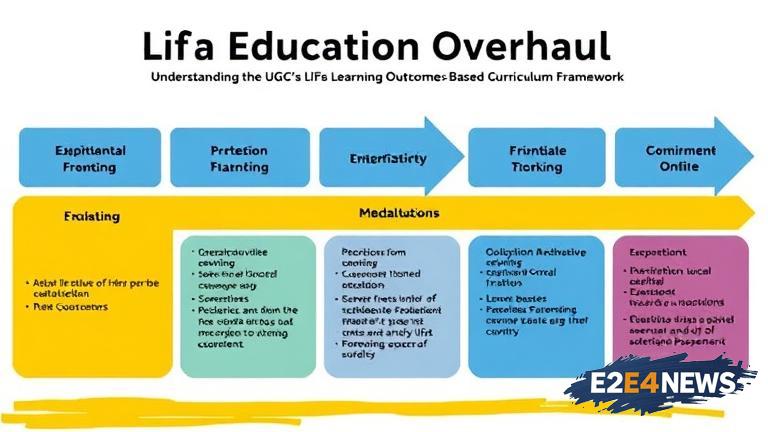The University Grants Commission (UGC) has introduced a new learning outcomes-based curriculum framework, aimed at transforming the country’s higher education system. The framework proposes a significant overhaul of the existing curriculum, with a focus on developing skills and knowledge that are relevant to the modern job market. However, the move has been met with resistance from the state of Kerala, which has expressed concerns over the potential impact on the state’s education system. The Kerala government has argued that the new framework will lead to a loss of autonomy for universities and colleges, and will also result in a homogenization of education across the country. The UGC has countered that the framework is designed to improve the quality of education and make it more relevant to the needs of the industry. The new framework proposes a credit-based system, where students will be awarded credits for each course they complete, rather than the traditional marks-based system. This will allow students to choose from a range of courses and create their own personalized learning pathway. The framework also emphasizes the importance of experiential learning, with a focus on hands-on experience and project-based learning. The UGC has also proposed the introduction of a national entrance exam, which will be used to admit students to universities and colleges across the country. However, this move has been opposed by many states, including Kerala, which argues that it will lead to a lack of diversity in the student body. The Kerala government has also expressed concerns over the potential impact on the state’s minority institutions, which may struggle to attract students under the new system. Despite the opposition, the UGC is pushing ahead with the implementation of the new framework, which is expected to come into effect from the next academic year. The move is seen as a major reform of the country’s education system, and is expected to have far-reaching consequences for students, teachers, and institutions across the country. The UGC has argued that the new framework will help to improve the employability of graduates, and will also make the education system more responsive to the needs of the industry. However, critics argue that the framework is too focused on vocational training, and neglects the importance of liberal arts and social sciences. The controversy over the UGC’s curriculum framework has sparked a wider debate over the future of education in India, with many arguing that the system needs to be more flexible and adaptable to the needs of the modern economy. The Kerala government has announced that it will not implement the new framework, and will instead develop its own curriculum, which will be designed to meet the specific needs of the state. The move has been seen as a challenge to the authority of the UGC, and has raised questions over the role of the central government in education policy. The UGC has responded by saying that it will work with the Kerala government to address its concerns, but has also made it clear that it will not compromise on the core principles of the new framework. The controversy over the UGC’s curriculum framework is likely to continue, with many states and institutions expressing their own concerns and reservations. However, the UGC remains committed to the implementation of the new framework, which it sees as a major step forward in the reform of the country’s education system. The move is expected to have significant implications for the future of education in India, and will be closely watched by educators, policymakers, and students across the country. The UGC’s curriculum framework is seen as a key part of the government’s efforts to improve the quality of education and make it more relevant to the needs of the industry. The framework has been designed to provide students with a more flexible and personalized learning experience, and to equip them with the skills and knowledge they need to succeed in the modern job market. However, the implementation of the framework will require significant changes to the existing education system, and will require the cooperation of states, institutions, and educators across the country. The UGC has announced that it will provide support and guidance to institutions as they implement the new framework, and will also establish a national monitoring and evaluation system to track progress and identify areas for improvement. The controversy over the UGC’s curriculum framework has highlighted the challenges of reforming the education system in India, and has raised important questions over the role of the central government and the states in education policy. The move has also sparked a wider debate over the future of education in India, and has raised important questions over the kind of education system that the country needs to develop in order to succeed in the 21st century.
